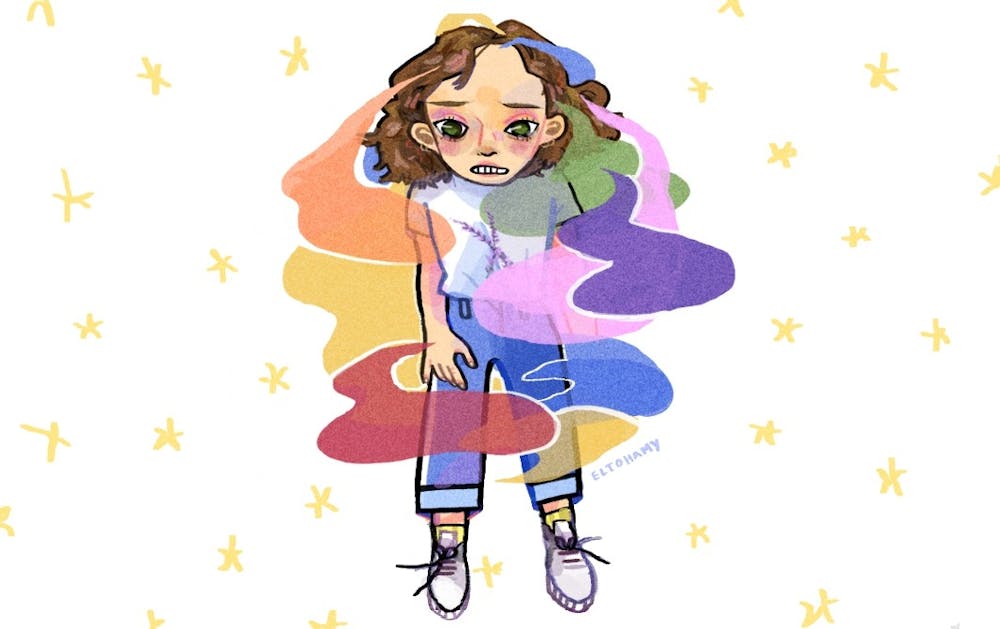I have a vivid memory of lying on the cold tile floor in my dark living room one night when I was 13. I was drowning in my own thoughts. I was alone and afraid.
There were routines I had to follow every day. I checked my window five times before I went to sleep; I tapped my leg four times before the refrigerator door closed; I couldn't wear a shirt again if I'd worn it on a bad day.
I knew what I was doing was illogical, but I couldn’t stop.
I thought I might have had some general anxiety, but little did I know it was so much more than that. I tried therapy in eighth grade because my thoughts became too much for me to handle on my own, but nothing seemed to be working.
My therapist at the time never diagnosed me with anything specific, but I knew what I was feeling wasn’t normal. There’s no way anyone could manage living like this for the rest of their life, I thought.
I don’t remember the exact age I was when I first read about obsessive-compulsive disorder, but I do remember being shocked at how much I related to the symptoms.
A lot of people believe OCD is limited to people who are germaphobes or “neat freaks.” But not all people with OCD deal with those specific issues, and not all people who have germophobia or think of themselves as “neat freaks” deal with OCD.
Because so many people overgeneralize OCD, it was hard for me to identify with the disorder because I thought I had to be extremely organized or afraid of shaking someone’s hand. However, I eventually figured out that OCD was what I was dealing with, as well as general anxiety disorder and depression.
At 13, that’s a lot to handle.
I remember thinking, “It’s going to be OK, I won’t have to deal with this forever. When I’m an adult, this will be gone.”
How wrong I was.
I spent the next six years completely consumed by my mental disorders. I felt like I was in a prison in my own head and had no control over my own life. A common feeling among those with mental illnesses, I felt like the only person I had to blame was myself.
Fast forward to last year. I was 19 and probably at the lowest point in my life, I felt consumed and paralyzed by my thoughts.
It felt hopeless — I couldn’t escape from my own head. I would come home after class and just lay in my dark bedroom and sleep.
It came to a point where I knew my OCD and depression were going to completely take over if I didn’t do something about it. I began searching for a therapist and ended up with the one I have today. I remember my thoughts trying to invalidate me, telling me “you’re not that bad, you don’t have OCD.” The thoughts grew louder and louder until my therapist finally diagnosed me with OCD.
I felt a blanket of relief fall onto me. I know that may sound strange — that I was happy when I was diagnosed — but the diagnosis meant I was finally validated, and I wasn’t crazy for thinking that I had OCD.
Things didn’t change overnight. It took a lot of work to get to where I am now. I was prescribed medication and was constantly working in therapy to control my OCD, instead of letting it control me.
I have good and bad days like anyone else. I know now that this is something I will have to continue battling probably for the rest of my life, and I’ve accepted that. I will battle the intrusive thoughts every day because I deserve to live my life.
Living with OCD feels like you are stuck in a box and you aren’t allowed to move, otherwise, everything will collapse on top of you.
What’s so ironic about it is that my OCD would tell me that if I carry out these routines and compulsions, that I will have control over everything in my life, when in reality, I had lost all control and the disorder was controlling me.
I also know that OCD is a coping skill, and part of its purpose is to help me — but it’s a toxic relationship.
It’s like the boyfriend who tells you he loves you, but you’ll be nothing without him. Living with that in your head every day and not being able to escape from it can be torturous.
My toxic OCD boyfriend never left me, and I don’t think he ever will, but I’m much better at shutting the door in his face before I let him inside my house.
Because of therapy, I have tools in my toolbox that allow me to better manage what I can control in my life. These learned skills allow me to sit with OCD and tell it to leave when it has overstayed its welcome.
Editor's note: For mental health services on campus, visit https://eoss.asu.edu/counseling. For immediate assistance, call 480-921-1006.
Reach the reporter at bstoshne@asu.edu and follow @itsbrennaaaa on Twitter.
Like The State Press on Facebook and follow @statepress on Twitter.




